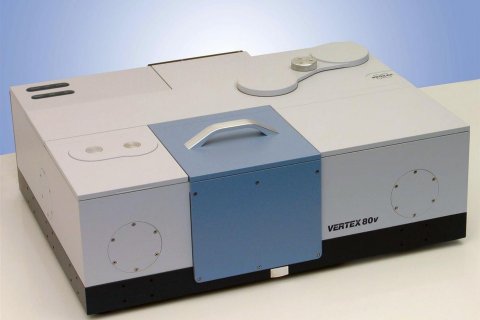The best performing research FTIR spectrometers on the market
The VERTEX 70v provides the advanced level of the Bruker VERTEX Series high performance FT-IR spectrometers. It offers unmatched performance and versatility for demanding analytical and research applications
Common VERTEX features:
VERTEX 70v features:
The permanently aligned RocksolidTM interferometer is a unique patented component which yields over 20% higher throughput than ordinary interferometer design. It benefits from dual retro reflection cube corner mirrors and wear-free pivot mechanism located in the center of mass, which ensures exceptional stability and reliability even in harsh environment. With its patented design, the elimination of mirror tilt optically and prevention of mirror shear mechanically is reached.
Advantages:
Bruker´s DigiTectTM detector technology ensures lowest electronic noise. It is based on modern dual-channel delta-sigma ADC’s with true 24-bit dynamic range integrated into the detector preamplifier electronics.
Vacuum Optics
With the evacuable optics bench of the VERTEX 70v vacuum FT-IR spectrometer, PEAK sensitivity in the mid-, near and far IR/THz regions is obtained without the fear of masking very weak spectral features caused by water vapor or CO2 absorptions. Outstanding results, e.g. in the area of nano-science research down to sub-monolayers, can be obtained.
The VERTEX FM far and mid IR functionality includes the unique ultra-wide range beamsplitter and wide range DLaTGS detector. In connection with standard internal IR source the complete far and mid IR spectral range from 6000 cm-1 to less than 80 cm-1 (50 cm-1 for VERTEX 70v) is accessible in a one-step measurement.
The step-scan technique allows the monitoring of the temporal progress of very fast reproducible events (transients) down to the very low ns-range. The interferometer mirror consecutively steps to the separate interferogram points one by one where the experiment is restarted again. Temporal resolution up to 2,5 nsec is possible.
For time-resolved spectroscopy of non-reproducible experiments, data can be obtained using the so-called Rapid-Scan technique. In this case the interferometer mirror moves very fast and up to 4 spectra can be extracted from each full forward-backward interferometer scan. Up to 110 spectra acquisition per second possible.
Are you interested in our products, applications and events? Don't miss single thing! You are welcome to subscribe.

I'm interested in this product:

The best performing research FTIR spectrometers on the market

